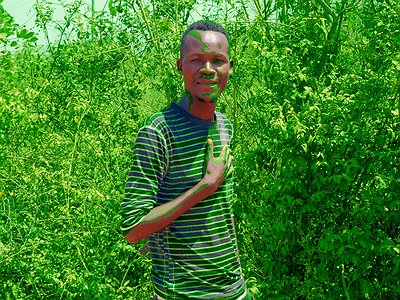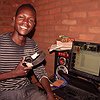Part 2
Could you take us through a day in your life, from a possible morning routine through to your work? Do you have a fixed schedule? How do music and other aspects of your life feed back into each other - do you separate them or instead try to make them blend seamlessly?
I don't schedule, we have a lot of things here to do for our survival, we're looking for money, we do this or that, depending on circumstances. Sometimes I need to go for something, that can brings the earn of that day. It means I will not make music that day. I aim to make money on production but it is a rare thing in Malawi. So, I just wake up and see what I have to do. When there is the possibility – I produce.
Music is a different type of job or talent. Sometimes when you are driving, in your head you are making music, you can be washing plates, but you are making music. That happens in my life. Sometimes I do other things, but the music is inside, it is circulating in my brain. Everywhere I am – I make music, but sometimes only in my mind.
Could you describe your creative process on the basis of a production that's particularly dear to you, please? Where did the ideas come from, how were they transformed in your mind, what did you start with and how do you refine these beginnings into the finished work of art?
It’s always easier to make music manually with instruments. When I record songs using only DAWs, like FL, Cubase, Reaper, it usually takes more time, but some songs are quite easy to produce, like reggae songs “Imba Africa” for example. Others like “Londezgani Chiuta” are more difficult, due to the bridges and progressions. In a way, using DAW is simple because you do one thing after another, but on the other hand, it is complicated, because you try to translate your feelings without the aid of an actual instrument. You have to bring the song to life little by little.
There are many descriptions of the ideal state of mind for being creative. What is it like for you? What supports this ideal state of mind and what are distractions? Are there strategies to enter into this state more easily?
First, I need to consider what I want to do. As you know, music is about the feel; I listen to my feelings, they are the thing I need most in my composition work. Some people might look for something else, maybe a sound or a beat, but I just follow my feelings.
How is playing the music live, recording it in the studio and editing/mastering it afterwards connected? What do you achieve and draw from each experience personally? How do you see the relationship between improvisation and composition in this regard?
Sometimes I record not knowing where it will take me. I might come up with a certain type of improvisation which I use because improvisation can bring you to places that you can't imagine.
Whenever I'm free, you will find me chatting with my musician friends or people who work on music. Even if we work together on something other than the music, still we discuss the production, because together maybe we can come up with something new, or share some knowledge.
How do you see the relationship between the 'sound' aspects of music and the 'composition' aspects? How do you work with sound and timbre to meet certain production ideas and in which way can certain sounds already take on compositional qualities?
There is a relationship indeed. If I say I like African music, firstly I have to find some instruments and timbres used in African music. If you add things like guitar, that flavour will not come out. Instruments determine the sound output and the quality of the sound.
For me it is a question of instruments and of effects. In Afro music, you don't need to put a lot of auto-tune, choruses or reverb, but rather things from that particular environment.
Our sense of hearing shares intriguing connections to other senses. From your experience, what are some of the most inspiring overlaps between different senses - and what do they tell us about the way our senses work? What happens to sound at its outermost borders?
This is important to me, thank you for this question. When you are composing and recording a song somebody brought you, you have to listen carefully and understand the song, see what it is like. Maybe it’s a mourning song, so you need to use mournful instruments. Or if the song is happy, then you need to use instruments that will make people feel it through their bodies. There is a connection.
Sometimes through music you have the pictures of people who you haven't met personally. I didn't know Bob Marley, but when I listen to his music, I can understand his character. I find with many singers – when you listen to the sound of their voices – you know something about them.
You tend to compose good songs, songs that are effective when your feelings are strong.
Art can be a purpose in its own right, but it can also directly feed back into everyday life, take on a social and political role and lead to more engagement. Can you describe your approach to art and being an artist?
As we grow, we have a lot of things which we need to express, and that's how art becomes a way of communication. You can communicate with people throughout the country, the continent, the whole world through the music you make.
In certain situations, we might need to say something about social or political issues. Music is a powerful instrument to reach people. I try to speak on behalf of people who cannot speak, to be a voice for the voiceless.
It is remarkable, in a way, that we have arrived in the 21st century with the basic concept of music still intact. Do you have a vision of music, an idea of what music could be beyond its current form?
Music of the future will improve with the technology, whether it’s gear, instruments or software. Thanks to technology, people are able to learn new things and learn from others, from all over the world. This was not possible in the past.
On the other hand, perhaps music might not get better. Sometimes technology means that people don't take the time to make good music. But music takes time to be learned, to be understood better. Nowadays, some people start record things they don’t even understand, which can affect the music in a negative way.






